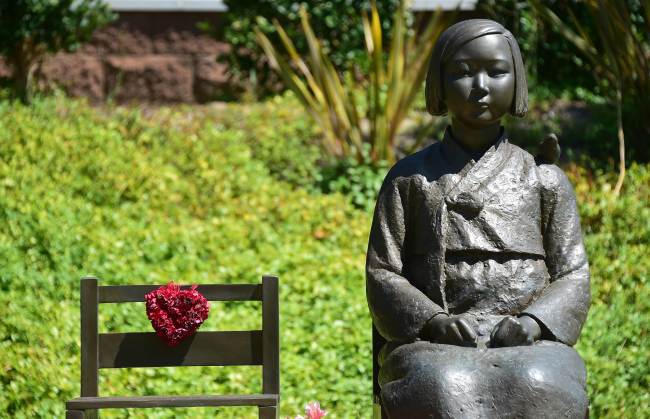The following is the eighth in a series of articles on Japan’s wartime sexual enslavement of Asian women on the occasion of the 61st anniversary of the foundation of The Korea Herald on Aug. 15. ― Ed.
In the grueling campaign to make Japan own up to its wartime sexual slavery, South Korea has not been alone. The United States, the European Union and other countries, as well as international organizations such as the U.N., have been key drivers of the campaign.
Recognizing Japan’s sexual enslavement of Asian women as a wartime human rights issue, the international community has been heaping pressure on Japan to change its unapologetic stance and take due steps to console the aging victims and compensate for their sufferings.
Particularly when the Japanese society is becoming conservative with the centrist, progressive political forces waning, the international pressure has been a critical variable to affect the minds of Japan’s policymakers and its public, experts pointed out.
“From Korea’s perspective, Japan’s historical views are revisionist and retrogressive as more and more Japanese people seem to countenance ultraconservative views that the victims were not forcibly mobilized. Such views have been spreading in Japanese society in general,” said Jo Yang-hyeon, a professor at the Korea National Diplomatic Academy.
“Thus, the efforts by South Korea and China to pressure Japan to have correct historical understandings are only limited. That said, the role of the international community is increasingly important and fortunately, there is already a consensus that the issue concerns the universal value of human rights.”
In the grueling campaign to make Japan own up to its wartime sexual slavery, South Korea has not been alone. The United States, the European Union and other countries, as well as international organizations such as the U.N., have been key drivers of the campaign.
Recognizing Japan’s sexual enslavement of Asian women as a wartime human rights issue, the international community has been heaping pressure on Japan to change its unapologetic stance and take due steps to console the aging victims and compensate for their sufferings.
Particularly when the Japanese society is becoming conservative with the centrist, progressive political forces waning, the international pressure has been a critical variable to affect the minds of Japan’s policymakers and its public, experts pointed out.
“From Korea’s perspective, Japan’s historical views are revisionist and retrogressive as more and more Japanese people seem to countenance ultraconservative views that the victims were not forcibly mobilized. Such views have been spreading in Japanese society in general,” said Jo Yang-hyeon, a professor at the Korea National Diplomatic Academy.
“Thus, the efforts by South Korea and China to pressure Japan to have correct historical understandings are only limited. That said, the role of the international community is increasingly important and fortunately, there is already a consensus that the issue concerns the universal value of human rights.”

In recent months, the international community has ramped up its efforts to make Japan take full responsibility for its use of Asian women, mostly from Korea and China, as sex slaves at frontline military brothels during World War II.
The increased efforts came after Tokyo carried out a controversial review of a 1993 landmark apology for its wartime sexual enslavement earlier this year. Following the review of the Kono Statement, Tokyo cast the apology as the product of a political compromise between Seoul and Tokyo, undermining its credibility.
The dwindling number of surviving victims is another reason that the international community has stepped up pressure on Japan to resolve the issue. The number of victims of sex slavery could be as high as 200,000, historians say. Currently, only 54 out of the 237 registered Korean victims are alive, with their average age at nearly 90.
Amid increasing international frustration over Japan shirking legal liabilities for the wartime human rights violations, U.N. High Commissioner for Human Rights Navi Pillay upbraided Japan last month for its failure to provide “effective redress” to the victims.
In a statement, she also expressed regrets that Japan failed to pursue a “comprehensive, impartial and lasting” resolution of the comfort women issue.
“It pains me to see that these courageous women, who have been fighting for their rights, are passing away one by one, without their rights restored and without receiving the reparation to which they are entitled,” she said.
“This is not an issue relegated to history. It is a current issue, as human rights violations against these women continue to occur as long as their rights to justice and reparation are not realized.”
Pillay’s statement was the latest in a flurry of U.N. efforts to resolve the comfort women issue. In July, the U.N. Human Rights Committee requested that Japan make immediate and effective efforts to address the issue.
U.N. efforts to underscore Japan’s liabilities for the sufferings of the former sex slaves began in the early 1990s when one victim after another started to speak up about their chastity and dignity being trampled upon at the comfort stations.
In 1996, Radhika Coomaraswamy, then the U.N. special rapporteur on violence against women, presented a comprehensive report on Japan’s wartime sexual slavery, which shed light on rapes and other appalling incidents at the comfort stations.
The report urged Japan to acknowledge that the sexual slavery system was a violation of its obligations under international law, and to accept legal and moral responsibilities for that violation. It also urged Japan to pay compensation to the victims and make a public apology to them.
Two years later, Gay McDougall, the then-U.N. Human Rights Commission’s special rapporteur on systematic rape, sexual slavery and slavery-like practices during armed conflict, submitted another report on the Japanese military’s wartime sexual crimes.
The 1998 report concluded that Tokyo remains liable for “grave violations” of human rights and humanitarian law ― violations that amount in their totality to crimes against humanity. The report, in particular, stressed the need for mechanisms to ensure criminal prosecutions and provide official, legal compensation to the victims.
Amnesty International, a global human rights watchdog, has also added to the international pressure on Japan to face up to the dark side of its history.
In its 2005 report, AI said the victims endured “horrific and debilitating sexual abuse,” and that the moral and legal basis for their claims is strong. It called on Tokyo to immediately implement administrative mechanisms to provide full reparations to all surviving victims.
The U.S., which has long championed the universal value of human rights, has been at the vanguard of international efforts to resolve the comfort women issue, despite its long-running strategic alliance with Japan.
During his visit to South Korea in April, U.S. President Barack Obama described what happened to the comfort women as a “terrible, egregious and shocking” violation of human rights. His remarks came amid increasing calls within the U.S. for Japan to appropriately deal with its past misdeeds.
In January, President Obama signed into law a spending bill for the fiscal year 2014 that included a provision pressuring Japan to apologize for its wartime sexual enslavement. It was the first time the issue of the victims had been addressed in U.S. legislation.

The EU has also joined international voices in calling on Japan to resolve the issue of its wartime atrocities. In 2007, the European Parliament adopted a resolution that urged Tokyo to “formally acknowledge, apologize, and accept historical and legal responsibility in a clear and unequivocal manner” for its military’s coercion of young women into sexual slavery.
To further drum up international support, the South Korean government is working on publishing a white paper containing historical facts about Japan’s sexual slavery during World War II and witness statements.
The white paper is to be published in English, Chinese and Japanese next year when Korea marks the 70th anniversary of its liberation from Japan’s colonial rule and the 50th anniversary of its normalization of diplomatic ties with Japan.
By Song Sang-ho (sshluck@heraldcorp.com)
-
Articles by Korea Herald









![[Hello India] Hyundai Motor vows to boost 'clean mobility' in India](http://res.heraldm.com/phpwas/restmb_idxmake.php?idx=644&simg=/content/image/2024/04/25/20240425050672_0.jpg&u=)









